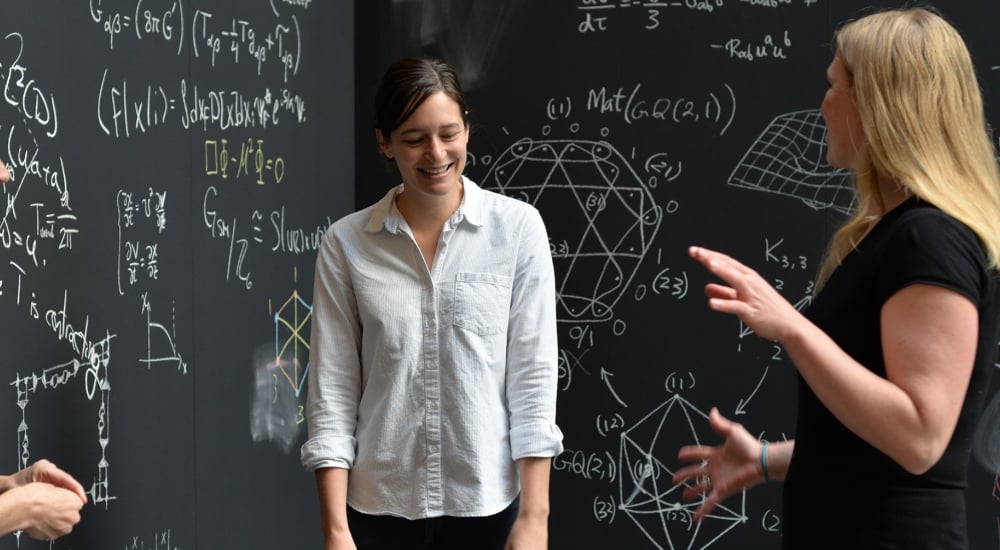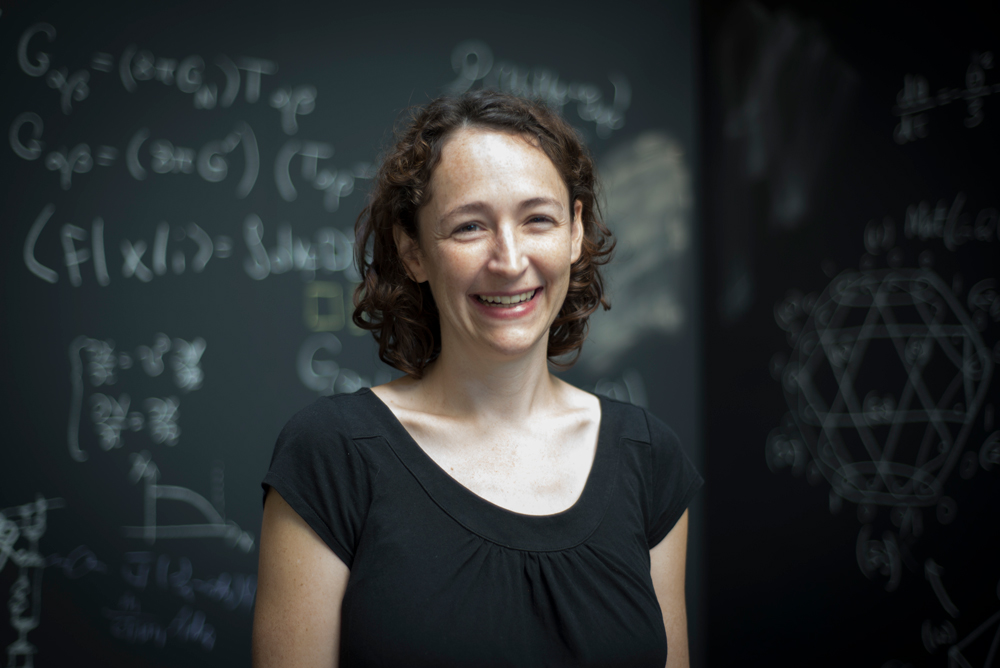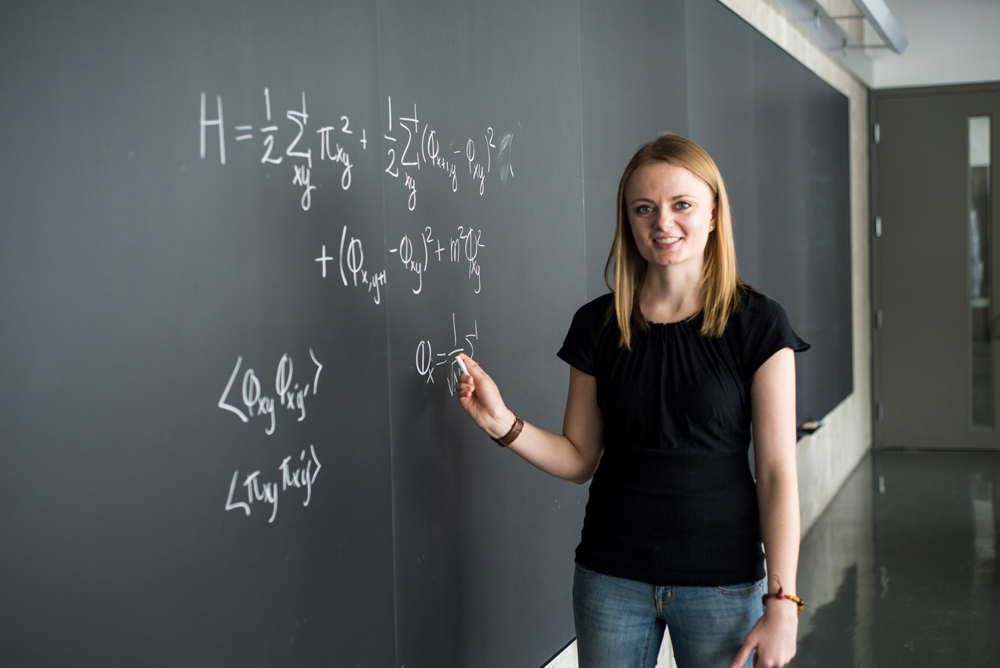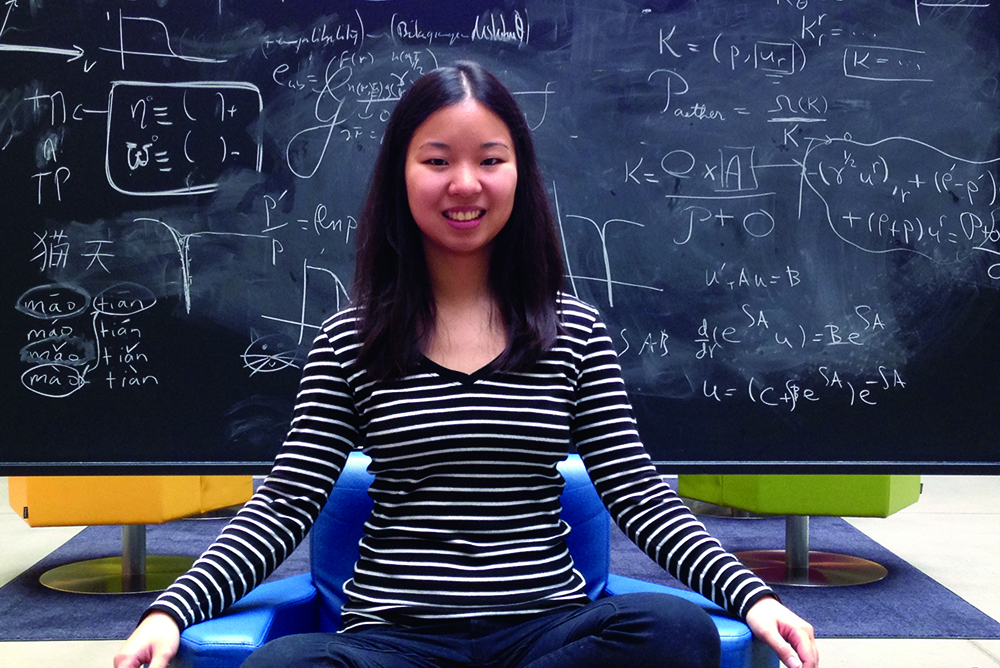Meet Perimeter's Emmy Noether Fellows, whose work is supported by the Simons Foundation.
Sarah Shandera
Emmy Noether Visiting Fellow 2015/2016
A cosmologist and assistant professor at Pennsylvania State University, Sarah applied for a Simons Emmy Noether Visiting Fellowship so she could return to Perimeter, where she had been a postdoctoral fellow. Perimeter arranged to bring Sarah, her daughter, and her husband to Waterloo so she could explore new science, free from her usual teaching demands. “A lot of interesting work here is connected to some of the puzzles we have in cosmology. My absolutely best-case scenarios: I’ll have completely new projects come out of this fellowship.”
Lauren Hayward
PSI Fellow
Named by Maclean’s magazine as a future leader in science, Lauren first came to Perimeter to attend the PSI program, and was so excited about the state-of-the-art numerical techniques being pioneered in Waterloo that she stayed to pursue her PhD in condensed matter. She is now a PSI Fellow: teaching the master's course while also pursuing research. “In many cases, young women don’t have female mentors to encourage and guide them throughout their schooling and their career. I think that Perimeter’s efforts are helping to shape today’s female scientists into mentors for the next generation.”
Mae Hwee Teo
PSI Class of 2015
The thrill of understanding nature propelled Mae from her home in Singapore to the United States for college, to the Fermilab particle accelerator for work experience, and then to Perimeter Institute for her master’s degree – all by the age of 23. The next stop: Stanford, to pursue her PhD in theoretical physics. “I feel physics is a very human endeavour, and it’s going on right now. Not just 300 years ago, or 100 years ago with Einstein, it’s going on right now. That’s pretty exciting.”
Previous Simons Emmy Noether Visiting Fellows
2020/21:
- Laura Bernard, relativistic gravitation and gravitational waves, French National Centre for Scientific Research at the Laboratory for the Universe and Theory (LUTH) at the Paris Observatory
- Isabel Cordero-Carriόn, mathematics, astrophysics, Department of Mathematics at the University of Valencia in Spain
- Sarah Croke, physics, mathematics, theoretical computer science, School of Physics and Astronomy at the University of Glasgow.
- Maria Elena Tejeda-Yeomans, interactions of quarks and gluons in extreme conditions, Universidad de Colima
2019/20:
- Sayantani Bhattacharya, black holes, National Institute of Science Education and Research in Orisha, India
- Cecilia Chirenti, strong gravity, Universidade Federal do ABC in Brazil
- Lavinia Heisenberg, cosmology, ETH Zurich
- Wei Li, quantum gravity, string theory, Institute of Theoretical Physics, Chinese Academy of Sciences
- Katherine (Katie) Mack, astroparticle physicist, North Carolina State University
- Catherine Meusburger, quantum gravity, Friedrich-Alexander University Erlangen-Nürnberg
- Monika Mościbrodzka, black holes, strong gravity, Department of Astrophysics at Radboud University
- Sylvie Paycha, mathematics, physics, Department of Mathematics at the University of Potsdam
2018/19:
- Ling-Yan (Janet) Hung, quantum field theorist, Fudan University
- Valentina Forini, string theory, City University of London
- Karen Livesey, condensed matter, University of Colorado
- Christine Muschik, quantum information, Institute for Quantum Computing – University of Waterloo
- Phiala Shanahan, particle physics, College of William and Mary
- Sherry Suyu, astrophysics, Max Planck Institute for Astrophysics – Technical University of Munich
2017/18:
- Olalla Castro Alvaredo, quantum field theory, City University of London
- Emanuela Dimastrogiovanni, cosmology, Case Western Reserve University
- Paula Mellado, condensed matter, Adolfo Ibáñez University
- Yaping Yang, integrable systems, University of Melbourne Yaping Yang
2016/17:
- Bei Zeng, quantum entanglement and quantum information, University of Guelph
- Céline Boehm, cosmology, particle physics and astrophysics, Durham University
- Didina Serban, quantum fields and strings, Institut de Physique Théorique - CEA Saclay
- Gemma De las Cuevas, quantum information and condensed matter, University of Innsbruck
- Mairi Sakellariadou, cosmology, King’s College London
- Radja Boughezal, particle physics, Argonne National Laboratory
- Sumati Surya, quantum gravity, Raman Research Institute
2015/16:
- Fiona Burnell, condensed matter, University of Minnesota
- Orit Davidovich, mathematics, Northwestern University
- Barbara Drossel, condensed matter, Technische Universitat Darmstadt
- Katarzyna Rejzner, mathematical physics, University of York
- Rachel Rosen, quantum field theory, Columbia University
- Sarah Shandera, cosmology, Penn State
2014/15:
- Alejandra Castro, quantum gravity, University of Amsterdam
- Belén Paredes, condensed matter, Ludwig-Maximilians-University (LMU), Munich
- Catherine Pépin, condensed matter, Institut de Physique Théorique - CEA-Saclay
- Silke Weinfurtner, quantum gravity, Quantum Gravity Laboratory, University of Nottingham
2013/14:
- Claudia de Rham, cosmology, Imperial College, London
- Sara Pasquetti, interface of mathematics and physics, University of Surrey
Learn how you can support Simon's Emmy Noether Initiatives at Perimeter.
Emmy Noether Fellows are supported by the Simons Foundation.



